As we grow, our parents assume hero status in an exciting and challenging new life. But how does that dynamic change when our parents are also sporting heroes known to millions across the globe?
Cricket has a steady stream of sons who have matched their fathers at test level. Many have exceeded their achievements in the test arena. But what forces are at play here; is it simply a repeating genetic pattern or the hothouse environment stimulated by a talented role model?
The nature versus nurture argument continues to tax the brightest of intellects; we know elements of both are thrown into the mix but which is the most dominant factor?
Charlie and David Townsend were the first father and son to play test cricket for England in 1899 and 1935 respectively; curiously both were qualified solicitors who ran the family law firm, and presumably grabbed someone else’s talent allotment as well as their own. However, living memories provide a treasure trove of related double acts.
Colin Cowdrey is described by Wisden as a portly, high-trousered strokesmith; who am I to argue as he looked more like the host of a DIY show than a world class cricketer. Complete with the initials ‘MCC’ it almost seemed pre-ordained that Cowdrey Snr would make his way in the game. A twenty-one year test career brought 114 caps, 22 centuries and two stints as captain.
Cowdrey had four children; the eldest Chris was born in 1957 and would have seen his father play in his prime. If the bar wasn’t already set unbearably high it nudged up still further with Peter May as his godfather.
Cowdrey Jnr made steady progress as a talented all-rounder making his debut for Kent the year his father retired (1976). With his godfather as Chairman of Selectors accusations of nepotism would never be too far behind. He was selected for the tour of India in 1984-85 and replaced Ian Botham; heaping yet more pressure on shoulders already burdened by the assumption of greatness.
Despite claiming the prized wicket of Kapil Dev it was a quiet tour for Cowdrey. In five test matches he scored 96 runs and took only four wickets. He wasn’t selected again until 1988 when he played in the infamous summer of four captains. Appointed as captain in the 4th test against the West Indies he scored a miserable 5 runs and took no wickets. England was soundly beaten by 10 wickets and Cowdrey had played the last of 6 tests. The debacle was not of his own making but further tainted a reputation already bruised by unfair comparison.
An intriguing footnote can be found in Chris Cowdrey’s son Fabian, whose star briefly shone as an all-rounder with Kent. A five year stint yielded a dozen first class appearances before he quit aged 23. Fabian later confided his heart was no longer in the game. But was the weight of expectation too great; did he pursue an ambition that wasn’t really his own. It feels like an assumption trumping the genetic and environmental argument?
Mickey Stewart was a typically chirpy South Londoner born in Herne Hill. His cheeky grin and ebullient manner made him the comic book hero who could play cricket and football. Stewart was a talented inside forward and capped at amateur level for England. He played for the Corinthian Casuals and managed 9 league games for Charlton Athletic before the focus fell on cricket. He became a bone fide legend and captained Surrey for nine years; as an opener shared a long standing partnership with John Edrich.
An eighteen year career brought Mickey 26,000 runs and 49 centuries; however, Stewart’s test career was surprisingly brief. He played in 8 test matches and averaged 35 with a top score of 87; but had stiff competition for the opener’s spot. Geoff Pullar, David Sheppard, Peter Richardson and a certain Geoffrey Boycott were all vying for the job. Stewart later served as England manager where fate dictated that son Alec would be in his charge.
Like his old man, Alec Stewart was ostensibly an opening batsman; but his undoubted skill as a wicketkeeper would often force him down the batting order. Nevertheless, he opened in 77 of his 235 test innings and scored a mighty 8,463 runs. A magnificent record includes 15 centuries, 263 catches and four stints as captain in 133 tests. Even though Alec was managed by his father there wasn’t the same burden of scrutiny that might have been expected. Mickey Stewart’s achievements in the test arena were modest and his son’s record would not be judged so stringently.
Top class Welsh cricketers have been a rarity down the years, but one of the first players to make it at test level was Jeff Jones. The powerfully built pace bowler made his debut for Glamorgan in 1960 and was a key member of the 1965-66 Ashes side. He looked set for a productive test career when a troublesome shoulder injury struck. Adjustments to his bowling action could not conceal arthritis in his elbow. After 15 tests and 44 wickets Jones’ playing career was over by the age of 26. Simon Jones closely mirrored his father’s trajectory; a pace bowler who played for Glamorgan and made his test debut aged 23. Just like Dad his career was wrecked by injuries.
During the Ashes tour of 2002-03, Jones ruptured an anterior cruciate ligament while fielding. After an absence of almost two years he was selected for the West Indies tour of 2004 and performed steadily. Jones was crucial in the 2005 Ashes victory taking 18 wickets at an average of 21.00. But he missed the final test with an ankle injury.
Jones succumbed to another serious knee injury which ultimately ended his test career. In 18 test matches Simon Jones took 59 wickets with a highly creditable average of 28. One can only wonder what might have been, but he certainly wasn’t bothered by the father/son dynamic. Significantly, Jeff Jones retired in the 60s and had long slipped from the public consciousness; and there was less awareness of his achievements for comparison.
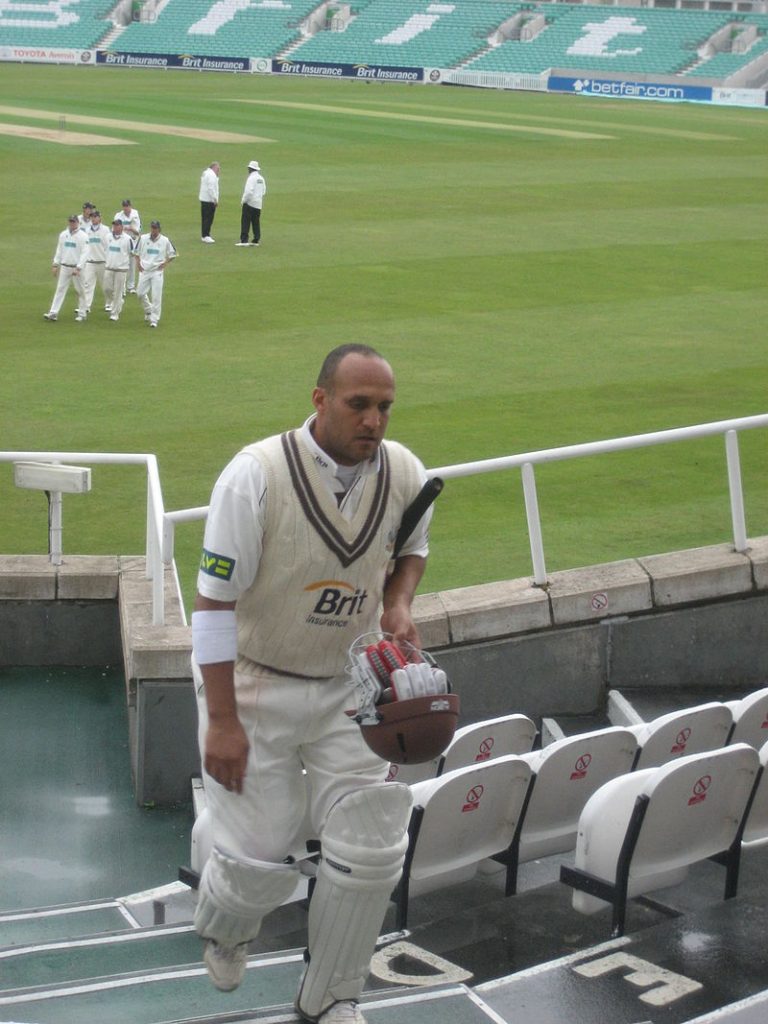
The Butchers were another father and son combo to play for Surrey and England. Alan Butcher is the oldest of three brothers to play senior cricket; and formed an opening partnership with Grahame Clinton that yielded 19 century stands. Butcher’s only test cap came in 1979 when he played at the Oval against India. He scored a disappointing 14 and 20. It’s surprising that he was never given another chance; particularly as he clocked up 22,000 first class runs and was also a useful medium pace bowler. But time and chance can be fickle opponents. As if to prove cricket runs through the family DNA, Alan has two sons that also played professional cricket.
Mark Butcher enjoyed a thriving career for Surrey and England until the dawn of the noughties. A loss of form led to his omission from the test side in 2000. His domestic prospects also took a nosedive in 2001 and found himself in the Surrey second XI. However, there could be no finer coach and mentor than his father. Slowly, he made his way back into contention, and was selected for the Headingley test against Australia. He scored a magnificent 173 not out to ensure an England victory.
Whilst injuries stalked the end of his career, Butcher the younger played in 71 Tests and made eight centuries with an average of 34. We assume that blood relatives support each other; but this is a fine example of a father who not only influenced but actively participated in his son’s career.
No father and son compendium would be complete without mention of Dean Headley. The Stourbridge born bowler is an exception as his father didn’t play test cricket for England. But Headley is unique as one of three generations to play at top level. After a stint with Middlesex, Headley joined Kent in 1992 and briefly flourished before injury curtailed his career. In 15 tests for England he took 60 wickets at an average of 27. His father Ron Headley enjoyed a long and successful career with Worcestershire and played in 2 test matches for the West Indies in 1973. Dean’s Grandad George Headley remains one of the game’s enduring legends. George appeared in 22 tests for the West Indies and was the first black player to stand as captain in 1948.
Even 30 years after his last test appearance, Chris Broad still seems one of the great unfulfilled talents to pass through the ranks. A fine opening batsman belied a suspect temperament at the crease. He was fined for knocking the stumps out when bowled during the Bicentennial test against Australia in 1988. Broad’s record of 25 tests, 6 centuries and an average of 39 showed untapped potential. The same could never be said of son Stuart, who is still going strong in the first class game at 35. His test record dives into the realms of fantasy with 148 appearances and 523 wickets at an average of 27.
The two most recent inductees into the father and son club are both contrasting examples of the relationship. Fast bowler Arnold Sidebottom played his only test match for England at the relatively late age of 31. He enjoyed a fruitful county career with Yorkshire but there was again a feeling of lost potential. Son Ryan resplendent with flowing curly locks, was briefly spearhead of the England bowling attack and took 79 wickets in 22 test matches.
David Bairstow was better known as a limited over specialist than a test player. Nevertheless, he still managed 4 test appearances and remained a highly effective wicket keeper and buccaneering batsman. His untimely death at 46 was a crushing blow, particularly for son Jonny who was only eight years old at the time. The experience would undoubtedly have been a spur while making his way in the game. Jonny’s achievements honour the memory of his father but he is sensitive to criticism; not an ideal trait for an elite sportsman. Even so, he has been a key member of the England test squad with 74 test caps to his name.
Fathers and sons playing the same sport have a special relationship. The sons have a perfect role model but also inherit the burden of maintaining the family’s reputation. They have to try much harder to prove they’re good enough and counter accusations of favouritism.
All of the sons listed here emulated their fathers’ test records; with the exception of Chris Cowdrey who had an impossible task following his father. In reality, nature and nurture are equal ingredients in what makes a son follow in their father’s footsteps. But perhaps there’s a simpler explanation; deep down inside most boys want to be just like their Dad?
Brian Penn

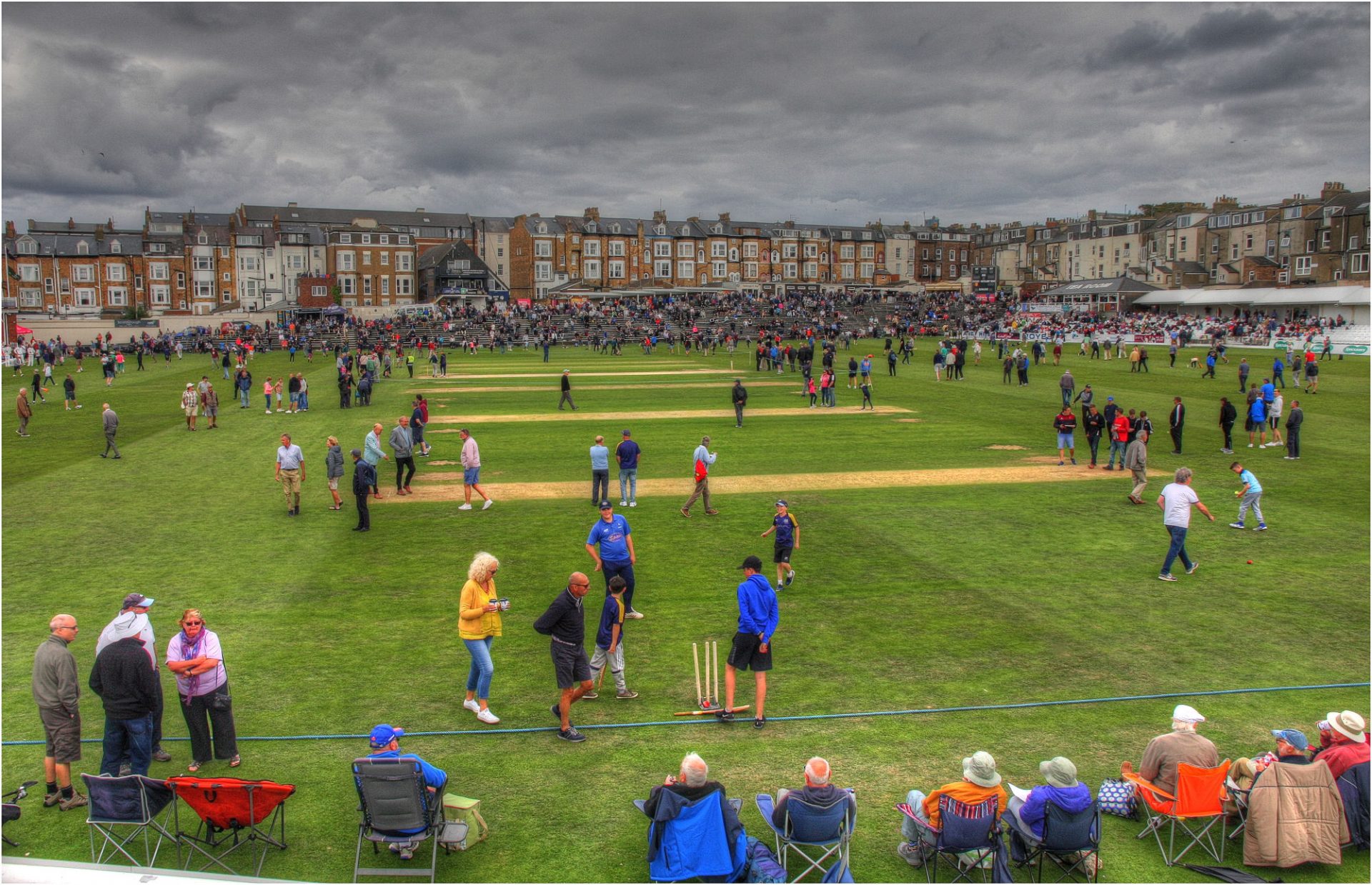

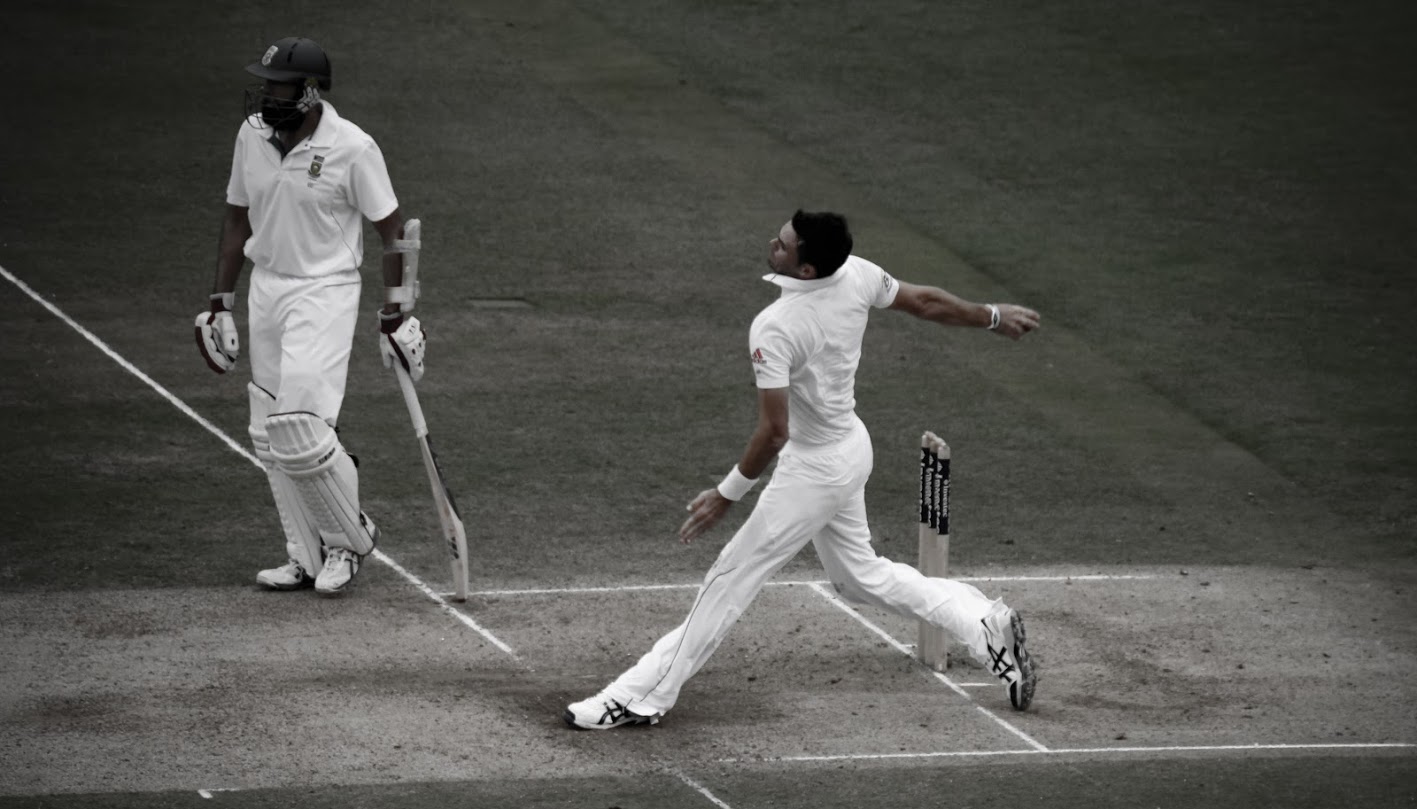
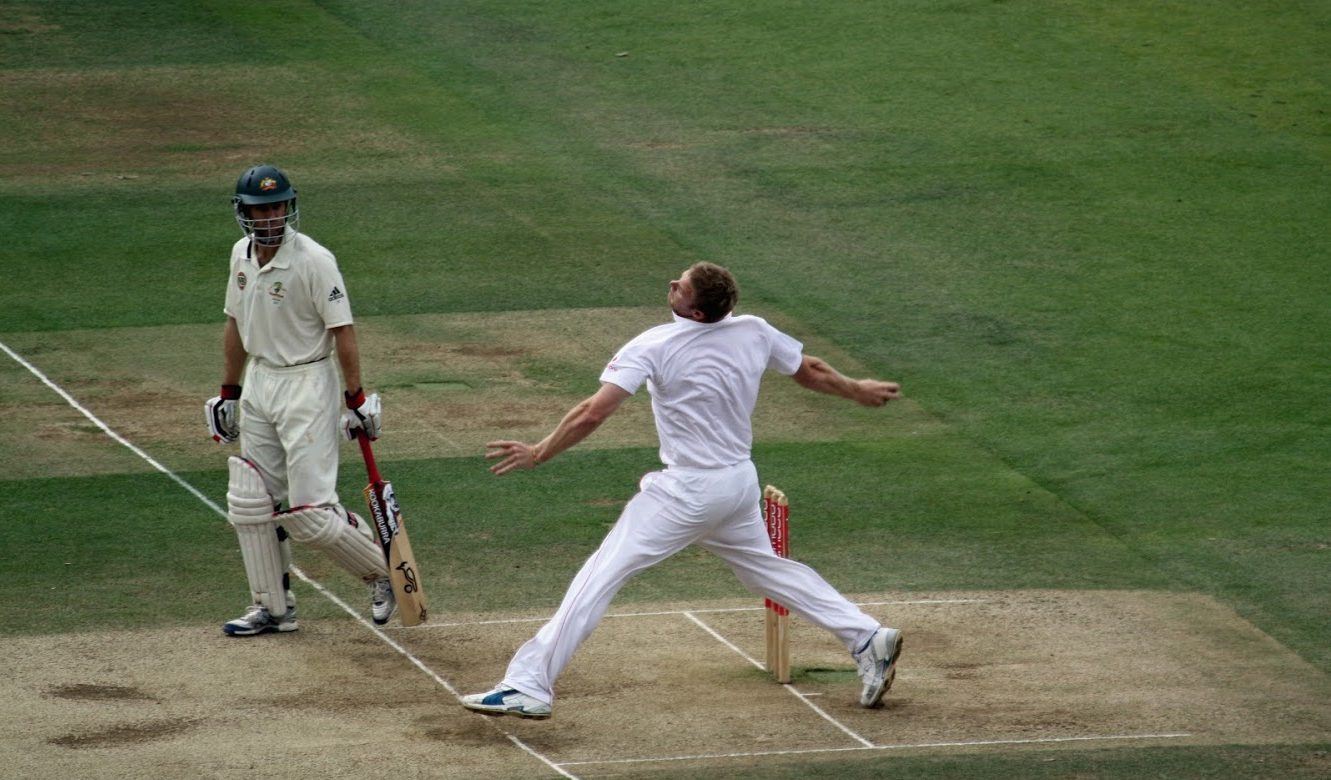
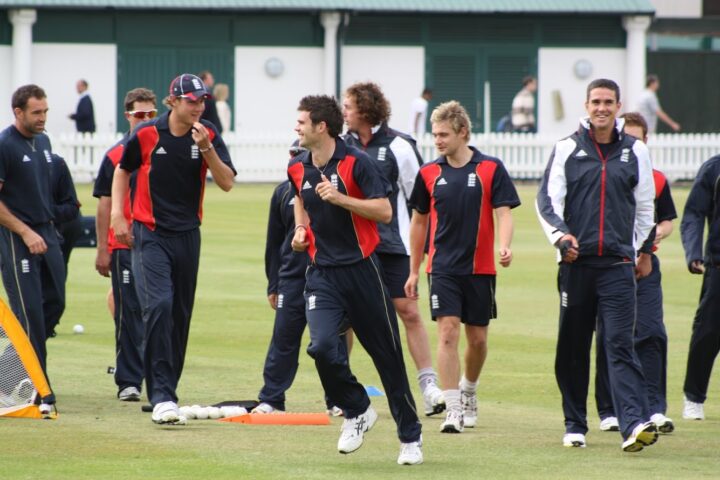
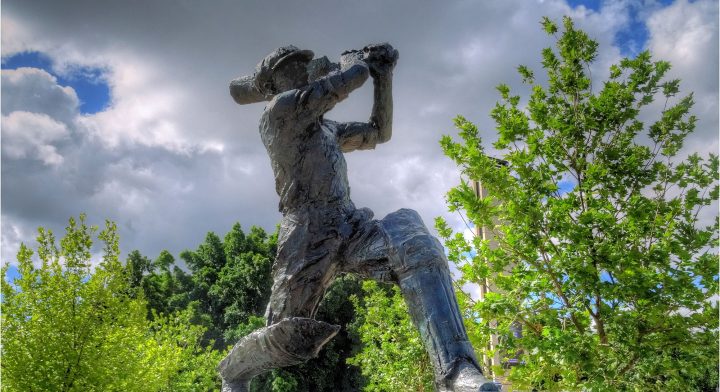


Good article. It’s a big ask to follow a famous parent, especially in the same sport. Ian Botham’s son Liam tried his hand at County cricket- taking a 5-for on his debut – before deciding his dad’s name was too hard an act to follow in cricket, and ended up pursuing a solid, if less spectacular, career in rugby. Beefy’s grandson James followed, making his debut for Wales last year.
James went to school near us. Chip of the old block, take it from me!
“Peter Drake”
“teacher”
“Hexham”
“Northumberland”
Wonderful article. How it all takes me back!
“Peter Drake”
“teacher”
“Hexham”
“Northumberland”
Don’t know what it is about cricket that produces so many sons emulating their father’s achievements in pro sport. Can’t think of another sport that seems to produce this so often. You’d struggle to name half a dozen footballers or Rugby players doing likewise and certainly individual sports aren’t laden with them, a few boxers maybe, but that’s about it as far as I can see. Have googled American Football, Baseball and Basketball, but can’t seem to find many even there, where opportunities are greater.
Thanks for the feedback. Much appreciated. Sons that follow their fathers in this way are showing real guts because of the stick they’re going to get. But Liam Botham showed similar bravery by admitting it just wasn’t for him?
I believe a similar situation was seen with
Sir Viv Richards and his son Marley who was once described as having inherited all of his father’s ability but none of his inhibition. It was to the relief of teams around the world when the young man decided his future lay elsewhere !
Peter Drake
Teacher and playwright
Hexham
Northumberland.
Hey Brian,
Is your dad Chris Penn? I played cricket with his father, Reg, at Dover and remember when he was born! In fact, I first made the Dover first XI for my fielding principally fielding close at short leg/leg slip to Reg and taking lots of catches off him!
Hey Chris – no Chris Penn isn’t my Dad. It’s surprising how many Penns are kicking around!
LOL – OK (my wife always steals mine!)
Afternoon, Chris Penn here, just scrolling through Internet cricket bits and pieces. I played at Kent CCC and Dover CC, my father being Reg and still going aged 90!.i certainly agree, it’s your parents that ignite your interest and I thank them forever. Best wishes, Lombok, Indonesia
There’s a sub-divison between those who follow exactly in their father’s footsteps (eg both Butchers being left-handed openers for Surrey) and those who take a different path within cricket (eg the Headleys). As regarding the latter, I’m sure I remember hearing that Stuart Broad was a batsman like his dad as a schoolboy but concentrated on bowling when told there would be less competition for a place.
One example of someone who had two generations of f/c cricketers behind him was Kyle Hogg whose father Willie also was a Lancashire seamer and whose grandfather was none other than Sonny Ramadhin. There don’t seem to be that many West Indian examples although Gordon Greenidge’s son Carl had a brief career as a seamer playing mainly for Surrey. One example of someone who had a cricketer father but went in a different direction was H.G. Wells whose father played for Kent – but H.G. preferred to write books like ‘War of the Worlds’ and ‘The Open Conspiracy’.
What a lovely ,interesting article
Thank you.
My claim to fame is that I once took Colin Cowdray to Manchester Airport from Old Trafford when he was unable to get a taxi.
He was so easy to talk to and sent me a letter of thanks.
I asked him why his mother had never told him that he should never get into cars with strange women..
There is the D’0liveria family too.
A father and son combo from an older age would be Fred and Maurice Tate.
Poor Fred Tate had probably the unhappiest England Test career of any player (except Andy Lloyd). He was picked for the 1902 Manchester as a bowler. England lost by 3 runs and Tate had the misfortune to be the last man out as well as having dropped an important catch in the field. Despite decent bowling returns he was never picked again.
Maurice Tate was of course a stalwart of Sussex and England in the 1920s, a difficult decade for seam bowlers like he was. Unlike his father he was also a capable batsman, good enough to score f/c centuries. Although undoubtedly a very good cricketer Maurice holds the unwanted record (unless it’s been broken in recent years and I’ve missed it) of bowling the most consecutive balls in Tests without taking a wicket.
Could also have mentioned the Pollocks (both Peter and Shaun were pretty useful), the Hadlees, the Marshes (though I suspect many Australians are really not that impressed with Shaun and Mitchell), and Mudassar Nazar, whose father was the first centurion for Pakistan. The Amarnath family probably also deserves a mention.
Obviously cricket has quite a few father son combos. Not as bad as say NASCAR (motor sports – obviously getting sponsors on board is easier when you have already a recognisable name), but it happens far more often than in other games and sports. In chess for instance it is practically unheard of that both father and son are among the elite chess players (even father son combinations to both achieve Grandmaster Title are non-existent as far as I know).
Maybe for cricket it also helps that there are fewer slots for players. There are roughly 400 county contracts or so these days, but in football you are competing with 1000s of others. And in individual sports it is even much worse.
The Townsends and Cowdreys both provided instances of four generations of their family having played first-class cricket. (Colin’s father, Ernest played one match in India.)
For other countries, there are also instances of multi-generational cricketing families. Basid Khan’s (Pakistan) father and grandfather played for Pakistan and India (before partition) respectively whereas the three Chappell brothers (Australia) were the grandsons of Vic Richardson.
Fathers and sons playing the same sport have a special relationship.